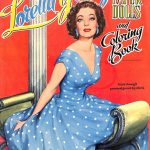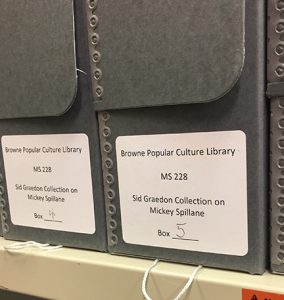The Browne Popular Culture Library houses more than 200 manuscript collections from authors, scholars, and organizations. Topics range from the history of popular culture studies to romance and mystery novels, with a little bit of everything in between.
For authors, manuscripts are a legacy for future generations, but it can be daunting to know where to start. Whether you are considering donating your papers to an institution like ours, or just keeping them together to serve as a record for your family history, we’ve put together some tips of how to start.
What to save: The basics
If you’re a working author, you likely have a pile of notebooks, loose papers and digital files for your past, current and future projects all at the same time. You want to hang on to what’s important, but where to start?
What to Keep:
Future researchers will want to be able to follow your creative process. To document that you’ll want to save anything related to:
- Story ideas, notes, and research
- Query letters and other early-stage
correspondence with agents or publishers
- Contest submissions
- Drafts and manuscripts
- Correspondence with publishers
- Edited manuscripts and foul matter
- Galley proofs and ARCs
- Anything relating to cover art such as publisher
information sheets, sketches or artworks, and proofs.
Marketing plays a huge role in the life of an author, so we want to make sure that is covered as well. You’ll want to save examples like these:
- Conference/signing swag like bookmarks, buttons,
cover flats, promotional postcards- please, nothing perishable or with strong
smells
- Clippings of reviews, interviews and profiles.
If you have recordings of TV interviews, those are great to have as well.
- Fan mail- while there is obviously a privacy
concern on behalf of those writing to you, we are happy to work with you to
anonymize the letters as much as possible.
What Not to Give:
There are things that we do not want to add to your archives. If we do find these items when
processing the collection, we will contact you to determine the best way to get
them back to you. This includes:
- Financial records- bank statements, cancelled
checks, royalty statements, bills, etc.
- Contract materials- for legal purposes, we
recommend that you retain anything related to contracts.
- Private personal items- Our goal is to make your
collections available for public research as soon as we can. If there are items
such as correspondence or unpublished writings that you do not want the public
to see, we recommend you hang on to them. If you would only like them to be
private for a period of time, we are happy to work with you on that. We want
you to be comfortable with the process no matter what.
How Do I Organize It All?
How should you organize all this stuff? It depends! Because we are trying to provide researchers with a glimpse into your process, you could simply leave everything in the order it sits in your file cabinet and put it in a box.
On the other hand, if you’re less orderly (which is fine!), we can sift through the materials when they arrive and try to create an order that will help researchers.
Any books will be separated and added to our book collections. Finally, when it comes to larger items, like posters or awards, we will generally separate them from other items to make sure they are housed appropriately.
Okay, I’m Ready to Donate!
Once you’ve decided that you’re ready to donate your papers to an institution, it’s a good idea to reach out to them and start a conversation about the process. It’s a good idea to take a look at the lists of collections already held by an institution to get an idea of what sort of things they are looking for. If you think the Browne Popular Culture Library would be a good home for your archives, you can reach out via our donation page.
Whatever institution you talk with, don’t be afraid to barrage them with questions. Ask about how they deal with things like shipping and gift acknowledgments. Get a copy of their Instrument of Gift and review it carefully. This is the document that sets the parameters of your gift, including access to materials, whether or not things can be reproduced, and what happens if the library decides it does not want some of the materials donated. If there’s something that doesn’t make sense, ask questions, or if there’s something you don’t want in the agreement, ask to have it removed.
Note that because it would be a conflict of interest, archives do not perform appraisals of donations. If you want a formal appraisal of your donation, there are a lot of lists of appraisers out there, such as this one from our friends at Ohio State’s Billy Ireland Cartoon Library & Museum.
We hope this post has been helpful! As always, don’t hesitate to reach out to us with any questions or concerns about the archiving and donation processes.
This post owes a great debt to the article “What SFWA Authors Need to Know about
Archiving Their Literary Papers” by Lynne Thomas: https://www.sfwa.org/2011/04/10/what-sfwa-authors-need-to-know-about-archiving-their-literary-papers1/






